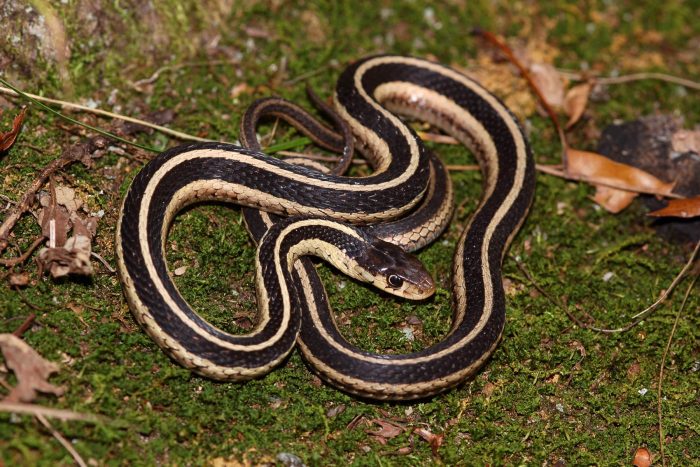Eastern Garter Snake
Thamnophis sirtalis sirtalis
The eastern garter snake is a common terrestrial snake. It is known for the three white or yellow stripes that run down the length of its back.
This section shows one large critter image at a time. Use the thumbnails that follow to select a specific image to display here.

This gallery contains a grid of small thumbnails. Selecting a thumbnail will change the main image in the preceding section.
Appearance
Adult eastern garter snakes grow to 18 to 26 inches long with keeled (ridged) scales and variation in their coloration and patterns. Their backs are dark brown, green or olive-colored with a distinct yellow or white stripe running down the center. This center stripe is often paralleled by two less distinct white, yellow, brown, green or bluish stripes, although occasionally individuals appear all black with no stripes.
The area between the stripes is often a checkerboard pattern of black or green spots. Some individuals have red or orange on the skin between their dorsal scales. The snake's unmarked belly is cream-colored to yellowish green.
Feeding
These snakes feed during the day on earthworms, millipedes, spiders, insects, salamanders, small fish, frogs and toads.
Predators
Predators include hawks, skunks, raccoons, larger snakes and bullfrogs.
Reproduction and life cycle
Eastern garter snakes mate in spring after emerging from winter hibernation. A single female may be courted by several males simultaneously, forming a "breeding ball." Unlike most snakes, garter snakes do not lay eggs. Females give birth to a litter of 10 to 40 live young in summer. Young are five to nine inches long at birth. Garter snakes typically live 3 to 4 years.
Did you know?
- Garter snakes are non-venomous, but can be fairly aggressive and will readily strike and bite, sometimes causing an allergic reaction in humans.
- If handled or attacked, they will release a foul-smelling musk.
- In Feburary 2016, Virginia named the eastern garter snake its state snake, beating out the timber rattlesnake for the honor.
Sources and additional information
- Peterson Field Guide to the Reptiles and Amphibians of Eastern and Central North America by Roger Conant and Joseph T. Collins
- Field Guide to Maryland's Snakes: Eastern Gartersnake – Maryland Department of Natural Resources
- Eastern Gartersnake – Virginia Department of Game and Inland Fisheries
- Eastern Garter Snake – Florida Museum of Natural History
